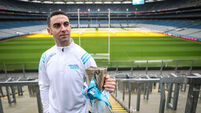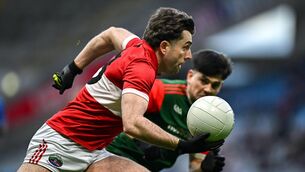King Henry coming down the tracks
IMAGINE, it’s 10 years ago next weekend. Henry Shefflin shakes his head at how time has flown and how the world has changed and how he was there when it happened.
He and Ken McGrath had gone over to New York together that September to play for the Waterford club out there, thinking they were just going to be getting in a few beers and some sightseeing to go with it. Then on the morning McGrath was scheduled to fly home, the phone in their Times Square hotel room rang shortly after they’d woken up. Something about the two towers and two planes. They followed the growing commotion out onto the street and then they saw it for themselves on those celebrated big screens: Armageddon was only downtown. They dashed to Grand Central to get one of the last trains out of the city, out to Queen’s where they had some friends, while naturally enough the last plane out of town had already flown.














